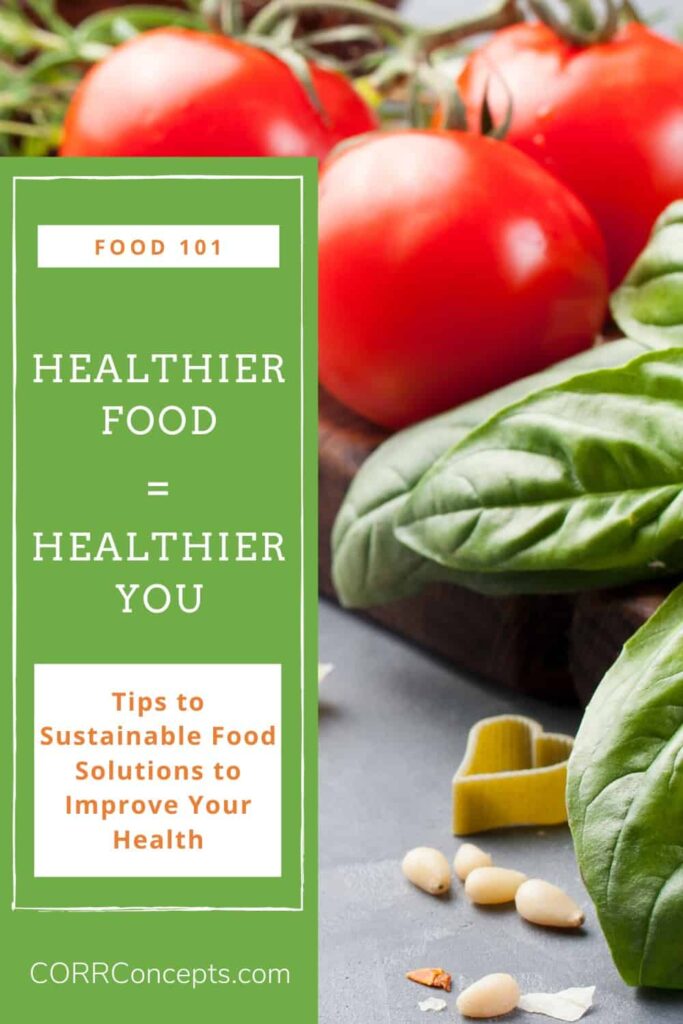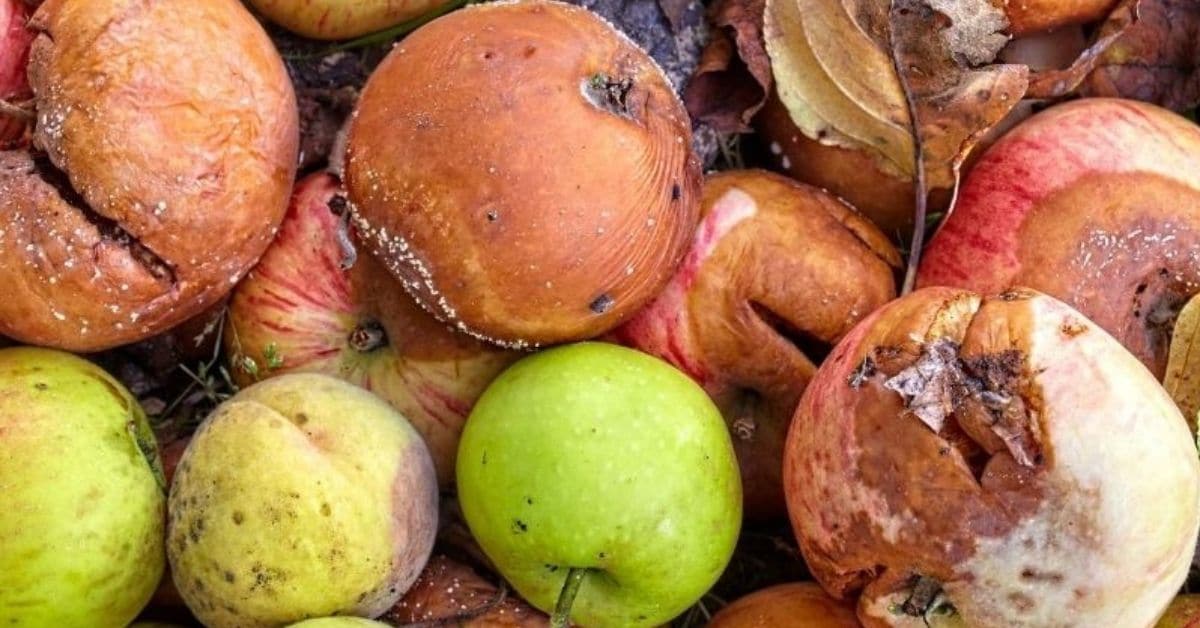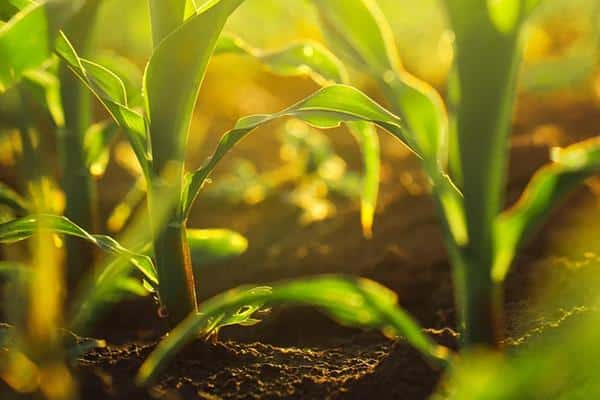
HOW TO ACHIEVE FOOD SUSTAINABILITY
Learn about food sustainability, why it is important, and actionable, sustainable food and money-saving tips to reduce your eco and carbon footprints for a sustainable lifestyle.
This site contains affiliate links for your convenience. The goal is to first provide links to eco-friendly, ethical, and sustainable brands, and then to those same type brands that use Amazon (i.e., Climate Pledge Friendly Certification), if possible. Therefore, you may see multiple links for one option. Should you make a purchase through any link, I will receive a small commission at no additional cost to you. See my Disclaimers & Disclosures and Privacy Policy for more information.
Like this? Share it with others!
Learn the “What”, “Why”, and, more importantly, “How to” achieve food sustainability with a FREE DOWNLOADABLE BELOW to get you started saving food and money everyday.
What is Food Sustainability?
When we talk about “sustainable food” we mean producing sustainably sourced food that:
- Does not damage the natural resources, local wildlife, and communities needed to grow the food now or in the future;
- Does not produce negative social or health impacts in the food consumption;
- Promotes fair and equitable trade in the food industry; and,
- Contributes to healthy economies across the supply chain from production to distribution to sale.
We also mean making the most of what food has already been sourced by ensuring food security for all and eliminating food waste.
According to the U.S. Department of Agriculture, 8.7 million U.S. households experienced food insecurity in 2018.
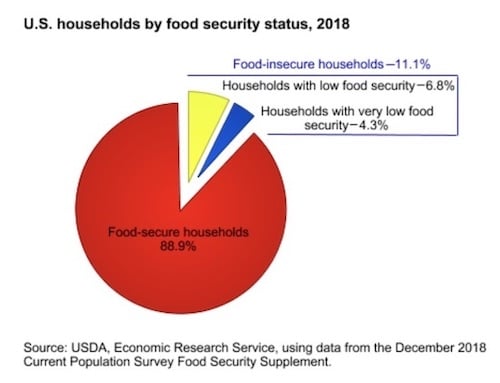
Additionally, an estimated 40% of food is wasted in the U.S. annually, amounting to $162 billion in food waste. If not wasted, this food could serve over 58 million meals in the U.S. annually.
Eliminating food waste has environmental, social and economic benefits for U.S. families.
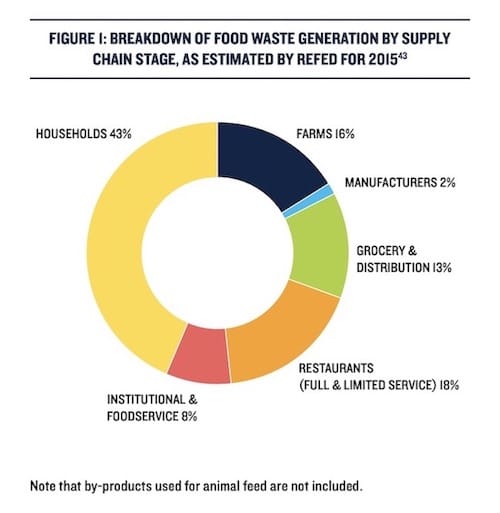
John Oliver does a great presentation on food waste in America. This video is well worth 18 minutes of your life.
The good news is that there are ways you can help now. You can individually implement methods of reducing your food waste production and reducing your non-sustainable food consumption through your daily actions and through the food options you use.
Little to big methods of change implemented individually can culminate to major, positive results towards reducing negative impacts on our environment.
Why is Sustainable Food Important?
Food production, distribution, and consumption play a critical role in the health of our environment, society and economy. Modern forms of irrigation, mono-crop agricultural, and farming practices are producing:
- Nutrient depleted soils;
- Top soil erosion;
- Depletion of fresh water sources;
- Air pollution through fossil fuel reliant equipment;
- Greenhouse gas emissions from animal wastes;
- Greenhouse gas emissions from unused food sitting in landfills; and,
- The mistreatment of animals.
Fishing industries are overfishing our oceans causing fish extinction.
Additionally, mass pesticide use is not only producing harmful health effects on humans, but they are also killing the ability for non-pesticide crops to grow and the local natural habitat and species, like bees, we rely on for pollination and food production.
Modern agricultural and farming practices promote transportation of food at great distances, causing more air pollution and greenhouse gas emissions, as well as lack of transparency in where our food comes from and how it was produced.
With the rise of convenience, mass food producers are churning out pre-packaged, processed food riddled with sugar, salt, fats, and many preservatives I cannot pronounce, causing an obesity epidemic in this country that is sorely underreported.
These foods are less expensive than fresh, healthy food and, unfortunately, are the only choice for many American communities because they live in food deserts.
At this rate, we will lose our ability to sustain ourselves on fresh, organic foods that the human body needs. We will live with more diseases, live less, and face rising medical and health insurance costs.
We also will deplete our natural resources and habitats beyond the ability to sustain us, thereby causing mass job loss and drop in the economy.
Sustainable agricultural, farming and fishing practices could reverse this. By operating with sustainability in mind, less fossil fuel is used, fewer greenhouse gases are produced, responsible fishing methods are employed, and higher quality food is produced without depleting our biodiversity.
These practices, of course, pass on to the stores and restaurants that we shop from.
How To Achieve Food Sustainability
Food Sustainability – Behavior Changes
Changing your daily food consumption and waste habits is the other component to working towards food sustainability. These habit changes can be done in different levels.
Go ahead and get started by downloading my Sustainable Food Checklist for FREE. This checklist will take you through Level 1 (easy and least expensive) to Level 3 (advanced and more upfront costs) steps to reduce food waste and save money.
All level steps will provide you a return on your financial investment no matter which steps you choose to take.
If you want more tips and ideas, check out the Sustainable Food blog posts that are continually added for your convenience.
Download and Get Started…
Get sustainable food tips at your fingertips. Download your Sustainable Food Checklist for FREE. I encourage you to review these tips, pick some to use, and take the Sustainable Food Challenge below.
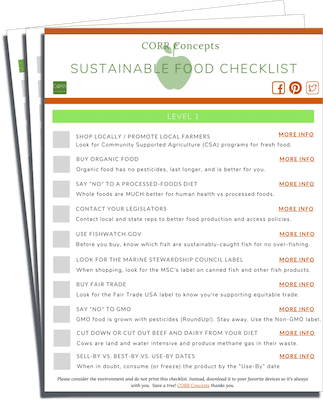
Food Sustainability – Conscious Consumerism
CORR Concepts is doing the home work for you to take the guesswork out of sustainable food options. Click the button below to be taken to the sustainable food third-party certifier list and ever-growing list of sustainable food options you can use to lower your eco and carbon footprints.
Take the Sustainable Food Challenge
Take the CORR Concepts “Sustainable Food Challenge” by:
1. Taking the pledge to buy local food. Get others to take the pledge.
2. Picking at least one more of the Sustainable Food Initiatives and implement them into your everyday life. Periodically, go back to remeasure your Ecological and/or Carbon Footprint to see if you’ve lowered your score. Keep adding more Sustainable Food Initiatives to your daily life to keep reducing your footprint(s).
3. Sharing this webpage with at least one person so that the sustainability message will spread and enrich and benefit us all.

